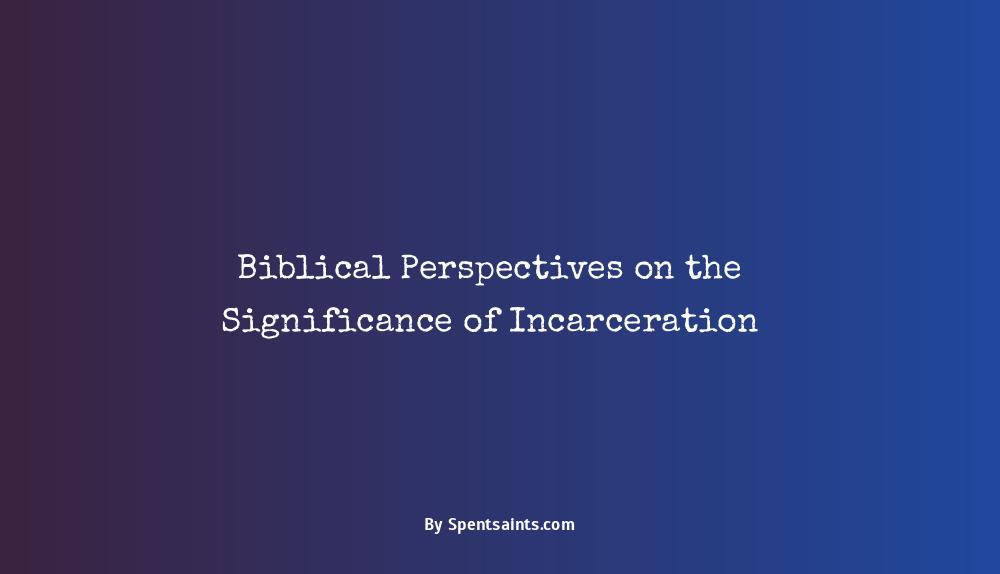Being incarcerated can be one of the most difficult experiences imaginable. Many people feel their faith waver during this traumatic and transformative period. However scripture provides relevant models and teachings on finding purpose and redemption amid adversity. By thoroughly examining biblical passages, we discover astonishing theories on spiritual development concealed within even the bleakest confinement.
The Universal Hardships of Isolation and Imprisonment
Incarceration often immerses inmates in complex hardships like severe isolation, loss of agency, uncertainty over the future, and a profound struggle for meaning. We must acknowledge that incarceration catalyzes deep emotional trauma before seeking insightful scriptural balms to nourish and inspire us.
Exploring Why Incarceration Disrupts Spirituality
Incarceration isolates people from societal rhythms and stimuli like mingling, culture and entertainment that most rely on to regulate mood and stimulate passion. Without these anchors, motivation withers. Boredom battles spiritual hunger. Cynicism infantizes dreams. Loneliness drains enthusiasm and attention. Meanwhile rules rigidly dictate activities, eliminating crucial feeling of autonomy that give life zest and direction.
These factors usually leave inmates starved for stimulation, inspiration or purpose. The ensuing void attracts darker emotions like resentment, fear, bitterness which further smother spiritual fire from growing vibrantly in confinement’s stark emptiness.
Acknowledging Hardship Allows for Spiritual Solutions
By first acknowledging these heavy realities that disrupt faith behind bars, we make way for scriptural wisdom to enter like sunlight and properly comfort, guide and transform our spirits positively. We must examine isolation’s spiritual starvation soberly before discovering passage’s profound remedies from the same shadows.
Pivotal Biblical Figures Who Grew Spiritually While Incarcerated
Scripture offers compelling examples of crucial figures who endured wrongful imprisonment yet unlocked profound self-realization and connection with God in the process. We discover radical theories suggesting confinement as orchestrated destiny for spiritual flourishing concealed within even the bleakest captivity. By exploring these stories, we unravel strategies for growth in isolation’s grasp.
Joseph: Unjust Suffering Can Empower Higher Purpose
In Genesis, Joseph is imprisoned in Egypt for years after his jealous brothers sell him into slavery. Once elevated from jail as Pharaoh’s trusted advisor due to his gift for interpreting dreams, Joseph forgives his betraying family and explains his ordeal as divine destiny saying, “You intended to harm me but God intended it for good.” His story becomes extraordinary template for deriving redemptive meaning from unjust misfortune.
This illustrates a radical notion – that confinement’s challenges push our spirits to strengthen and bend nearer divinity not despite hardship but precisely through it. By embracing suffering as a secret pathway for growth orchestrated by a loving God, we unlock provocative new paradigms for reconciling faith with endured adversity.
Apostle Paul: Writing Letters That Transformed the World
After his conversion, Paul traveled spreading the Gospel until imprisoned for controversial teachings. However his involuntary immobility became opportunity to prolifically write letters so impactful they comprise much New Testament Scripture. Paul allowed isolation’s apparent hindrance to channel higher inspiration. His writing spurred early church growth indicating that confinement, approached properly, uniquely fuels revelation.
Both Paul and Joseph’s stories, echoed by other imprisoned prophets like Jeremiah, imply that spiritual flourishing blooms exceptionally in adversity’s fertilizer. By surrendering to mystery of confinement’s hidden purpose, we prepare for divine cultivation yielding extraordinary fruit. What first appears dead soil becomes rich pasture from which passionate faith springs intensely.
Principles for Spiritual Growth and Redemption in Incarcerated Life
For contemporary inmates, exploring scriptural passages unveils groundbreaking templates teaching spiritual redemption hidden within the bleakest confinement when faced with courage, vision and wisdom.
Reframing Perspective: Adversity as Opportunity
Like Joseph and Paul, we must reframe confinement’s apparent adversity as ordained occasion for profound self-examination and stronger faith. What imprisons body liberates spirit as isolation strips distractions forcing intense soul-searching. We reconnect with abandoned aspects of identity and form more authentic self-awareness. We shed false priorities that shackled us. We emerge more fully realized, decisive and aligned with convictions.
If we surrender to mystery of confinement’s purpose with faith like Joseph, we receive stimulation and provocation from stillness to feed hungry spirits. We become co-authors of our redemption stories, turning bleakest chapters into our most brilliant through trust, vision and courage.
The Power of Preparation and Investment
We must also follow Paul and Joseph’s template by preparing assiduously for providence through diligent study, skill cultivation and service. We uphold human dignity by lifting fellow inmates through acts of love and meaning like counseling, teaching, writing or creating despite confinement’s imposed constraints. Where mobility lacks, ingenuity and compassion thrive.
Investment in others stimulates our growth. By nurturing community where isolation starved kinship, we nourish spirits and direction blooms spontaneously when focus lifts from self-pity toward contributing purposefully.
Finally, scripture teaches us that the true fruits of spiritual redemption reveal themselves upon re-entering society. Will we reflect Joseph’s grace by pursuing reconciliation without resentment for those complicit in our confinement after experiencing incarceration’s unexpected spiritual bounty?
Having cultivated integrity, will we integrate our gifts honorably into communities now ripe for our unique contributions? With spirits now flourishing from once-lifeless soil, we hold profound capacity for ministry addressing the injustices, inequities and trauma spawned by the very system that once confined us.
Truly then do we close the circle on profound redemption when we direct hearts, forged vigorously in isolation’s fire, toward uplifting those still under its crushing burden – thus extracting profound meaning from our hardship.

Dreams, spirit, growth – I explore them all. Laugh, learn, grow with me. Unlock your inner guru.
